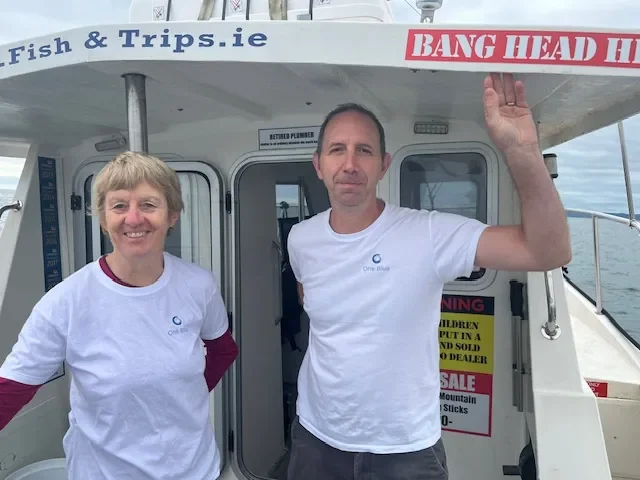

Charting the Chemicals: DCU Launches Biota Sampling for One Blue Project in the Irish Sea
The world’s oceans are under increasing pressure—not only from overfishing and rising temperatures, but from the growing presence of chemicals of emerging concern (CECs). These are substances that may not be fully regulated or routinely monitored but are increasingly found in our waters, ranging from pharmaceuticals and personal care products to industrial compounds and pesticides. They can enter marine environments through wastewater, runoff, and atmospheric deposition, accumulating in sediments and organisms, and potentially altering ecosystems in complex ways.
Recognising the urgency of this threat, the One Blue project was launched in 2023 as a major EU-funded initiative aimed at transforming how we monitor and manage chemical pollution in marine environments. Bringing together 18 institutions from across Europe—including Dublin City University (DCU), where the project is led by Dr. Anne Morrissey—One Blue is investigating the spread, impact, and risk of CECs across four key marine regions: the Arctic, the Mediterranean Sea, the Atlantic Ocean, and the Irish Sea.
At its core, One Blue seeks to answer a pressing question: How are these invisible pollutants impacting ocean health in the context of climate change? To answer that, the project integrates marine biology, environmental chemistry, toxicology, and data science—developing new tools and knowledge to support future EU marine policy.
A New Wave of Monitoring
What sets One Blue apart is its holistic approach. Rather than simply measuring the presence of pollutants, researchers are conducting biological assessments, deploying sensor technologies, and building a new CEC database. This database will act as an early warning system—flagging emerging threats and guiding environmental decision-making before damage becomes irreversible.
One Blue also applies metagenomics and mesocosm experiments to study how marine organisms and microbial communities respond to chemical exposure under changing environmental conditions. The aim is to not only monitor pollution but to understand its ecological and genetic effects in real-world scenarios.
DCU in Action: Biota Sampling at Lambay Island
DCU is leading a key component of the One Blue project in the Irish Sea, an ecologically and economically important region that is heavily trafficked, urbanised, and influenced by agricultural runoff. Last week, a multidisciplinary team from DCU’s School of Mechanical Engineering, School of Biotechnology, and the DCU Water Institute kicked off the first stage of a biota sampling campaign.
Departing from Malahide Marina on a flooding tide, the team—supported by local fishers and two experienced anglers—navigated to the eastern coastline of Lambay Island, known for its rugged shores and seabird colonies. Here, fish were collected to serve as biological samples from trophic levels 3 and 4—a vital part of understanding how chemicals and microplastics accumulate and move through the marine food web.
These samples will now be analysed using state-of-the-art ecotoxicological bioassays and effect-directed analysis. In tandem with future samples from the southern Irish Sea, this research will help paint a clearer picture of the chemical burden on marine life in Irish waters.
Looking Ahead
The data collected by DCU and other partners will feed into a new, integrated assessment framework for evaluating chemical risks in marine environments. This framework will support smarter, more proactive environmental management—not only by governments and regulators, but also by industries and communities.
Ultimately, One Blue aims to inform next-generation EU marine policies that can balance economic development with ecosystem protection. As climate change accelerates and industrial activity expands, ensuring the health of our oceans is more vital than ever.
